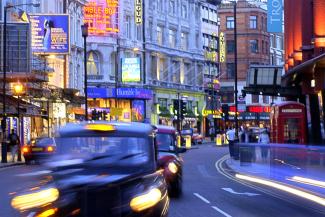
Look at these examples to see how we use the present simple and continuous.
The world is changing and it's changing rapidly.
The earth revolves around the sun in approximately 365 days.
I'm an engineer, but I'm working as a taxi driver at the moment.
My daughter is always leaving clothes all over the floor.
Try this exercise to test your grammar.
- Grammar test 1
Read the explanation to learn more.
Grammar explanation
Basic contrasts
We use the present simple to talk about:
- something that is always or generally true
When you heat ice, it melts.
- something that happens regularly
I go swimming twice a week.
- continuing states.
She's very happy with her job.
We use the present continuous to talk about:
- actions which are in progress at the moment
He's busy. He's giving a presentation to some clients.
- temporary actions
I'm working from home this month.
- something generally in progress but not actually happening at the moment
More and more people are feeling the effects of climate change.
- future plans that have already been organised.
I'm going to Ghana next month. I booked my flights yesterday.
State verbs
State verbs describe a state rather than an action. They aren't usually used in continuous forms, so we use present simple instead of present continuous.
I don't know the answer.
I'm not knowing the answer.
He really likes his new house.He's really liking his new house.
They seem busy at the moment.They're seeming busy at the moment.
State verbs often relate to:
- thoughts and opinions: agree, believe, doubt, guess, imagine, know, mean, recognise, remember, suspect, think, understand
- feelings and emotions: dislike, hate, like, love, prefer, want, wish
- senses and perceptions: appear, be, feel, hear, look, see, seem, smell, taste
- possession and measurement: belong, have, measure, own, possess, weigh.
Some verbs have a stative meaning and a different active meaning.
I have a new computer. (state – possession)
I'm having a quick break. (action – having a break is an activity)
This coffee tastes delicious. (state – our perception of the coffee)
Look! The chef is tasting the soup. (action – tasting the soup is an activity)
Other uses of present continuous
- verbs describing change and development
Life is becoming more expensive.
- complaints and annoying habits
He's always coming in late and making noise.
Other uses of present simple
- headlines
In headings at the top of articles in newspapers and magazines, references to the past are usually simplified to present simple.
Billionaire buys multinational company
- instructions
Open the link and enter your password.
Plot summaries
Note that when describing the story of a book, film, play, etc., we use present tenses.
She quits her job and goes in search of adventure.
While she is travelling in India, she meets someone special.
Anecdotes
People also sometimes use present tenses to tell an anecdote – a funny or interesting story about a real incident. This makes the story more immediate and dynamic.
So I'm on the bus and this guy comes up to me and starts talking to me about someone called Dev. I'm like, 'Sorry, do we know each other?'
Do this exercise to test your grammar again.
- Grammar test 2




helpful, thanks!
Easy